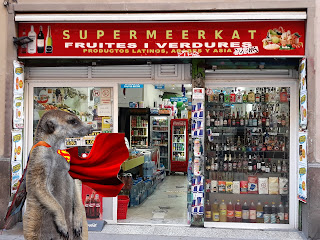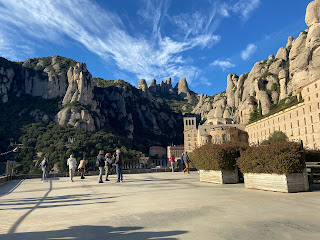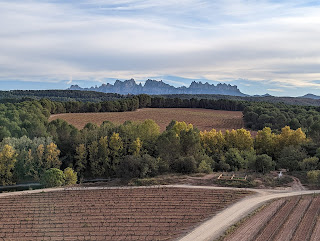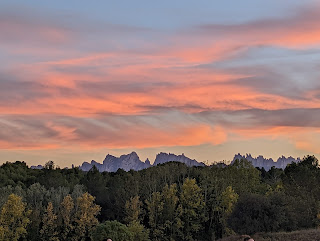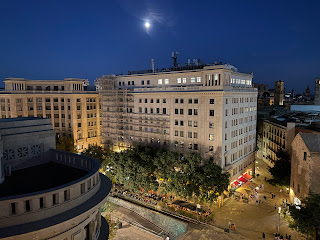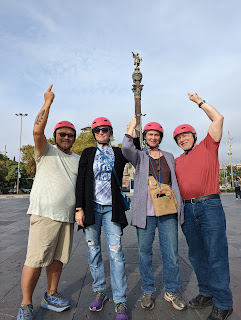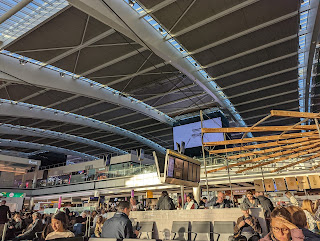Denis Wallez commented: If you get 'lost' in your hobby, then it's unwholesome. If you get irritated whenever someone interrupts you during your hobby, then it's unwholesome. If it can create envy, anger, habituate the mind to violence, then it's unwholesome.
Sunday, December 25, 2022
Not Even Not Zen 284: A Response on Hobbies in Buddhism
Sunday, December 18, 2022
Not Even Not Zen 283: Tucker Mythology - How Not to Plan a Rafting Trip
Sunday, December 11, 2022
Not Even Not Traveling: Barcelona, 2022
Barcelona, 2022
Barcelona 1, On Bikes - You may get closer to pedestrians and other vehicles than you like. Still recommended.
Barcelona 2, On Segways, On Food, and On Our Own - Segways are fantastic. So is Disfrutar.
Barcelona 3, On Gaudi and Can Sole - Fun problems. The walking tour needs adjustment. The eating at Can Sole is great but unlike other places you'll need your Spanish ready.
Barcelona 4, On a Mountain - You should take the hike. You should resist the cheese.
Barcelona X, On Supermercats in Barcelona - Okay, not a brilliant observation.
Barcelona 5, On Archaeology, On Travel - An unexpected find, wonderful if you like getting down into history at a personal level.
Barcelona Z, On Systems Analysis and People - Systems can be complicated and wonderful. People are better.
Saturday, December 10, 2022
Not Even Not Traveling 24: On Systems Analysis and People
Sunday, December 4, 2022
Not Even Not Traveling 23: Barcelona 5, On Archaeology, On Travel
Saturday, December 3, 2022
Not Even Not Traveling 22: On Supermercats in Barcelona
Friday, December 2, 2022
Not Even Not Traveling 21: Barcelona 4, On a Mountain
Thursday, December 1, 2022
Not Even Not Traveling 20: Barcelona 3, On Gaudi and Can Sole
Wednesday, November 30, 2022
Not Even Not Traveling 19: Barcelona 2, On Segways, On Food, and On Our Own
Not Even Not Traveling 18: Barcelona 1, On Bikes
Sunday, November 27, 2022
Not Even Not Zen 282: Biomythography - Note 36b, That Asshole Tree
Sunday, November 20, 2022
Not Even Not Zen 281: Biomythography - Note 36a, That Asshole Tree
Sunday, November 13, 2022
Not Even Not Zen 280: Biomythography - Note 35, Corporal Punishments
Corporal Punishments
On a Saturday morning, I sat at the kitchen table flipping through the sequel to a book I'd read the night before. Light swept in from the windows on my left. Farther to my left, outside, I could hear my mother clipping trees. She had strolled around the house to work on her gardens. This was during the summer when I was twelve.
In those days, I was often the last to sleep and the first to wake. Sometimes, late at night, my father discovered my lights on and made me turn them off after berating me that I was ruining my eyes with my reading. He kept late hours himself, smoking, eating popcorn, and sitting in front of the television. My mother hadn't re-discovered reading yet so on weekends she sometimes started her day before anyone else. This was one of those days.
My father had raised me on the theory that bright, motivated people need less sleep. It was no surprise to see him up in the morning as early as my mother and I were. He took a playful swing at me as he passed from the dining room to the kitchen. I saw his fist coming and dodged.
"Move that book under the light!" he said. "Remember your eyes."
I grunted and kept reading.
For a while, he clanged through the drawers. He shuffled the copper-bottom pots in the kitchen behind me. I glanced over my shoulder once or twice when he fell quiet. The second time, he was trying to sneak up from behind to hit me. I noticed and glowered at him. He turned back to his copper-bottom frying pan. He tossed in another two pieces of bacon as if he hadn't been caught.
This was his way. He had grown up with physical humor, rough jokes, pranks, and corporal punishments. In contrast, I felt bewildered by most of his pranks. I read books constantly or sat with books in my lap, lost in thought. Something about those bookish habits irritated my father.
But I kept reading.
A few minutes later, as the bacon sizzled and popped, my father snuck three steps closer and smacked me on the back of the head. He hit me hard enough to make me drop the book.
"Quit it!" I yelled.
"No." He pulled back as if he would smack me again although, at this age, he couldn't reach me if I saw it coming. I'd built up better blocking reflexes. "Don't raise your voice in the house. That was nothing."
He was right. It was normal for him, for us, and maybe for the times. A lot of parents had grown up with corporal punishments harsher than they gave. His mother had grown up in an orphanage where discipline had been uneven and hard. When it came her turn, she meted out for her son a set of similar, arbitrary punishments. To those generations, ours seemed soft. When I got lost in my reading, I would fail to notice my father, which upset him. That's why he he smacked me a few times a day almost every day. Sometimes four or five days in a row went by during which he didn't catch me daydreaming or I didn't get in trouble or we didn't cross paths. As an estimate, he made contact with my head three hundred times per year, roughly, from the ages of five to fifteen. It didn't seem like much at the time, though. It was simply part of the background of my life.
An ordinary part of life or not, it had an effect. Currently, although I still lose myself in whatever I'm doing, I turn and respond quickly to sounds behind me or to the sides. At some base level, I have slightly more physical awareness than I'd have otherwise acquired.
That may not seem like a good trade-off for all the prank hitting but it was his judgment call. Likewise, so were all the spankings, slaps, hard labor, or other attempts at physical correction during the generations that preceded ours. In those times, every parent believed in corporal punishment. Many societies support it now. It's tried and true; it's worked as the main system of behavior correction for hundreds of thousands of years, possibly millions, depending on how you count the different lineages of humanity.
"I think timeouts are working," Diane would tell me, years later, in defiance of those million years.
"Yeah." I had to agree. We sat in the living room and watched our oldest son stand in the corner. He had put himself there.
Our generation marked a change. It seemed like a risky experiment. Maybe it still is. At the beginning of our parenting as part of Generation X in the United States, I believed that constant corporal punishment was necessary. Diane did, too. But she had noticed another way. She had seen it in action and wanted to try it, corrective behavior without any hitting, without even casual slaps on the hand.
That sounds like a big change. But as a parent, it wasn't too big to enact.
Children respond to all sorts of feedback. A gentle lecture can seem pretty intimidating. A timeout is perhaps the gentlest of corporal punishments, no hitting involved. It's true that most kids get violent at some point because they can't have what they want. But they commit kid-sized violence, easily stopped, dodged, or prevented with a diversion. I'm not suggesting that parents don't need to defend themselves or their property. You don't need to let kids rip apart books or poke holes into precious paintings. But when they're little, you can just move them away from doing it, too.










